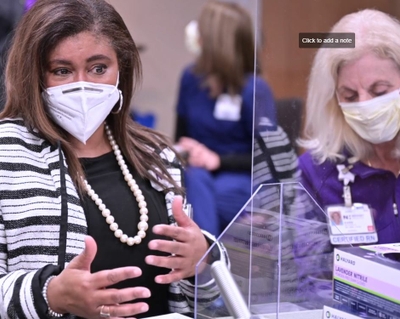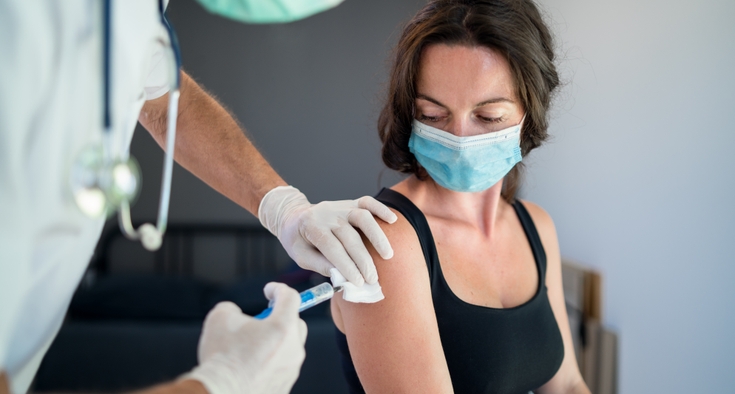Ask Novant Health team members why they’re getting the COVID-19 vaccine and the starkest answer just might come from Denis Neba, who works in patient transport rolling patients from their room to tests, procedures and discharges.
“We see people die every day,” Neba said. And it’s his job at Presbyterian Medical Center to deliver those COVID patients to their very last stop at the hospital — the small unmarked morgue located off a side hallway deep within the building.

COVID-19 has killed more than 350,000 people in the United States as cases spike during the winter months, just as scientists predicted.
Neba said he’s tired of worrying about catching the virus, sad to see patients pass and just wants it all to be over. “It’s a great thing to get the vaccine,” he said moments after receiving his first of two injections Jan. 7.
And he was in good company on a recent weekday, surrounded by doctors, nurses, certified medical assistants and others who all stood in line to get the vaccine. As of Jan. 12, Novant Health had administered more than 15,000 vaccines, which includes 2,000 second doses. Hundreds more get their shot every day to protect themselves, their families and follow the advice of scientists who say this is our ultimate way out of the pandemic.
Still, public apprehension about the vaccine has been well-publicized, and health care workers have had their own questions. After all, they were first in line. While many team members signed up without a second thought, others paused to ask themselves: Given how fast this vaccine came together, how do we know it’s safe?
The answer from public health care experts: Remember, the COVID vaccine was tested on 70,000 people before it was made available to the public. Government and independent scientists — all free from political influence — carefully researched and reviewed all the science and findings behind development of the vaccines before declaring them safe. While the vaccine was indeed produced in less than a year, it’s based on a decade of scientific research around messenger RNA (mRNA) technology.
‘I felt comfortable’
Early in the new year, nurse practitioner Daniel Brewer was just getting off a 24-hour shift of caring for some of the most fragile patients at Presbyterian Medical Center in Charlotte – newborns in the neonatal intensive care unit at Novant Health Hemby Children’s Hospital.
But instead of heading home to grab a shower and scroll through news and social media before falling into bed, Brewer took the elevator down the cavernous ground floor at Presbyterian to get the second dose of his COVID-19 vaccine.
“Honestly, I just looked up the history and the research,” said Brewer, who still finds time to be working on a doctorate degree. Research around the current vaccines actually goes back a decade, he said, so “that’s why I felt comfortable.”

Nurse Mindi Moore was administering the vaccine at another station nearby: "I'd be lying if I didn't say I did have some hesitancy," she said. But "I definitely knew it was the right thing to do. And being able to be patient-facing in my position where we intubate patients and I'm standing bedside helping with that, it's, it's a good thing to do, and it's the right thing to do, and being able to help the community and be with my family and my other patients."
A few moments later, case manager Tanya Horn was rolling up her sleeve across the room. “I'm excited,” she exclaimed. “I feel like I'm doing something to protect myself, help myself. I did have a family member who lost their husband this week, to COVID. So it really made me feel like I'm doing the right thing.

“I was very anxious for a minute. But last night, I was praying, I read my Bible, and prayed before I came here, so I feel comfortable. I've left it in God's hands that, you know, he has me covered and he's taking care of me.”
As a case manager, it’s Horn’s job to make sure that patients have a smooth and orderly discharge, that they have all the resources they need to make a full recovery. COVID-19 has made that job a lot more challenging. Some families are fearful to let loved ones back home after being treated for COVID-19.
“But we’re working through it….,” Horn said. “And I hope that other people in the community will get to a point that they trust (the vaccine). That they see health care providers receiving it and that they will be OK with it.”

Allyson Stuart, a manager for employee heath at Novant Health, helped set up the operations that deliver the vaccines to team members day and night.
“I tell people when they come in the door and they're nervous. ‘I had my shot three weeks ago and I feel great.’ I tell them our experience with it,” Stuart said. “We’ve had common reactions (sore arm, slight fever for a day) but no bad reactions.”
But even as these team members complete their second of two shots, they’ll continue to mask at work and in public in the coming months as the shots roll out to the general population. For the time being, those steps remain part of the core strategy for controlling the pandemic.
Caption top photo: Nurse Tracy Forster administers the vaccine to Dr. Arthur Cohen.








